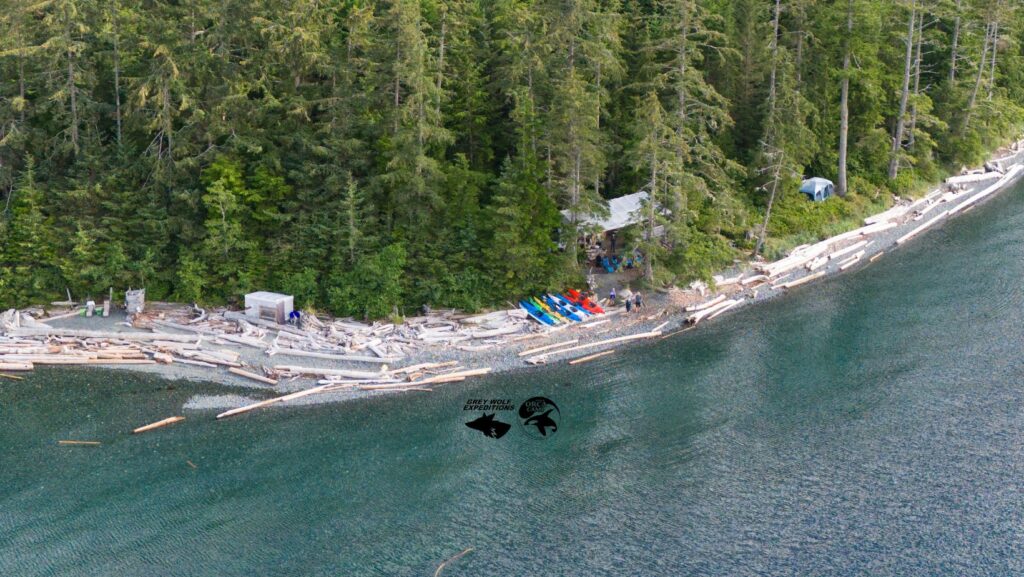The Northern Resident Killer Whales, a distinct population of orcas that inhabit the coastal waters of British Columbia, have captivated researchers and wildlife enthusiasts with their unique behavior: belly rubbing on pebble beaches. This fascinating activity, observed primarily along the coast of Vancouver Island, offers an extraordinary glimpse into the intimate and mysterious lives of these magnificent marine mammals.
Vancouver Island’s Rubbing Beaches
Vancouver Island is home to several rubbing beaches, including the world-renowned ones in the Robson Bight Ecological Reserve. This reserve is specifically an area reserved for the Northern Resident Killer Whales. No boats, passengers or kayakers are allowed in this specific area. Grey Wolf Expeditions Inc. has a lease from the Canadian Government just a few miles down from the Robson Bight Ecological Reserve and has built over the past two decades, a beachfront camp that aligns with the natural serenity these whales seek. Striking a balance between being low-key yet luxurious, quite but still offering activities that do not disturb marine wildlife; Grey Wolf Expeditions’ efforts have paid off: over the past ten years, we’ve been fortunate to witness family pods of northern resident orcas approaching our beach during the summer months and rub their bellies and multiple occasions. Key to this success: Keeping guests quite through-out the time visiting Orca Camp!
From July through mid-September, these awe-inspiring creatures occasionally treat us to breathtaking displays. Tail slaps, fin slaps, and even full breaches right in front of our camp are moments that leave us and our guests in absolute wonder. While no wildlife sighting can ever be guaranteed, the setting and timing of our 4-day/3-night trips in the heart of orca territory offer over an 80% chance of glimpsing these majestic animals.
Why Do Orcas Belly Rub?
The behavior of belly rubbing has intrigued scientists for years. Here are some of the leading theories we believe to be true:
- Social Bonding Belly rubbing is thought to be a social activity that strengthens the bonds within family pods. Orcas are highly social animals, and this behavior may serve as a form of communal interaction or even play.
- Exfoliation and Grooming The smooth, rounded pebbles found on these beaches may provide a natural way for orcas to exfoliate their skin. This grooming behavior could help remove parasites or dead skin, promoting healthier skin and overall well-being.
- Sensory Pleasure Orcas have highly sensitive skin, and the tactile sensation of rubbing against the pebbles might simply feel pleasurable. Much like a human enjoying a spa treatment, orcas may engage in this behavior for the sheer enjoyment of the sensation.
- Cultural Tradition Northern resident orcas exhibit behaviors that are passed down through generations, suggesting cultural learning. Belly rubbing may be a long-standing tradition specific to these pods, deeply ingrained in their way of life.
A Front-Row Seat to Nature’s Wonder
As stewards of this incredible environment, we’re humbled and privileged to share our space with the northern resident killer whales. Our commitment to preserving the natural harmony of our camp has allowed us to become part of their habitat, and we take great pride in providing our guests with an unforgettable experience. Whether it’s witnessing a pod glide gracefully through the water or hearing the hauntingly beautiful calls of orcas echoing across the bay, every encounter is a reminder of the profound connection between humans and the natural world.
If you’re looking to immerse yourself in the heart of orca territory, connected and nestled in the wilderness of Vancouver Island, no building, no board walks, no street lights and no generators and potentially witness these extraordinary creatures in their element, our multi-day trips offer the perfect opportunity. Join us to experience the magic of Vancouver Island’s rubbing beaches and create memories that will last a lifetime.
